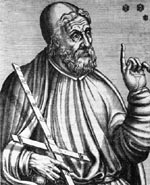| |
 |
| An
imagined portrait of Ptolemy holding a cross-staff (a later invention)
for measuring star separations. |
Of
Ptolemy the man
we
know very little. His recorded observations span the period from the ninth
year of Hadrian's regime (125) to the fourth year of Antoninus Pius (141),
and were made in the longitude of Alexandria. This could mean either the
city of Alexandria itself, or possibly nearby Canopus. Founded by Alexander
the Great on the western edge of the Nile River Delta, Alexandria benefited
from Egypt's rich lands along the Nile and quickly became one of the wealthiest
cities in the Greek world. The city's Library had perhaps as many as half
a million books, including possibly Aristotle's personal collection. Astronomical
instruments were also built at the Library, and observations carried out,
initially under the patronage of the wealthy ruling pharaohs or kings
(also named Ptolemy). By Ptolemy's time, however, Alexandria was a Roman
provincial city.
|


